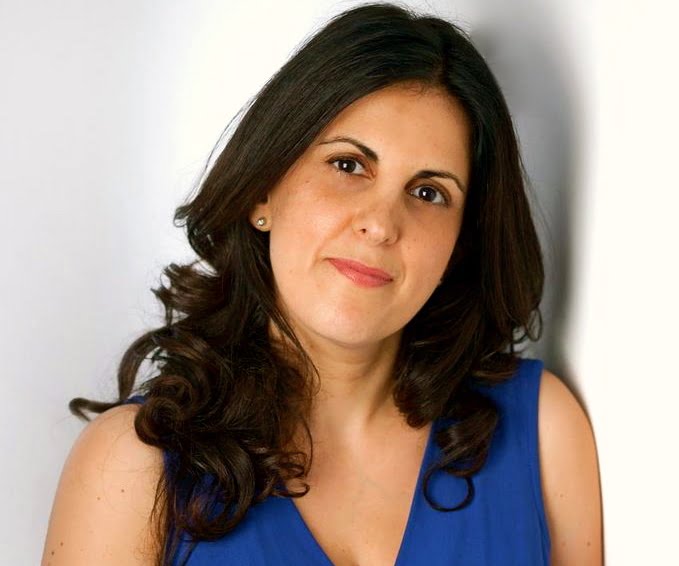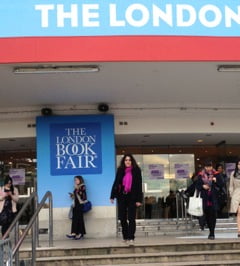British author Maria Constantine describes how the development of her writing career was shaped by repeated visits to the London Book Fair over a four year period, culminating in self-publishing her debut novel.
Looking back over the four years I’ve been attending the London Book Fairs, I am encouraged by the exciting changes I have witnessed within the industry.
When I first attended in 2011 I knew very little about publishing, but at the end of the 2013 London Book Fair, I decided to digitally publish my debut novel rather than contact the literary agent who had given me her card to submit my manuscript.
Asserting Control
The bottom line was that I wanted to maintain creative control over my book. The manuscript had been professionally edited and proofread more times than I can recall, so I wasn’t against making changes. I had changed the title, deleted a chapter and scenes in the editing process, but there was certain content I was not prepared to change. The only way I could secure this content was to indie publish.
Entering mainstream commercial women’s fiction with a different voice and not conforming to the trend in trade publishing within this genre was more important than acquiring a traditional publishing deal.
Gaining Knowledge
I had gained enough knowledge over the years to take the leap. I had a folder of notes and contact details from the countless seminars I had attended. ALLi’s Choosing A Self-Publishing Service 2013 served as a useful guide, highlighting options and providing practical advice. I bought my own ISBN numbers, entered into a contract with Authoright for cover design, author website, marketing, and employed the services of Firsty Group to convert the file into eBook formats.
The True Meaning of Self-Publishing
Over the years I have heard the term self-publishing used a lot, but in my experience it can be misleading: I did not publish on my own as implied by the term self-publishing. Indie publishing is a more accurate representation as it takes into account strategic partnerships formed to achieve the end product. I was guided by professionals in their area of expertise and followed blogs like Joanna Penn’s to help steer me in the direction I had chosen.
When I was uploading my Mobi file onto the KDP site I came across the DRM question and fondly recall contacting ALLi for advice. The indie community has a spirit of we-are-all-in-it together and I value the on-line writing community I am part of where we share experiences.
At the 2014 London Book Fair I wore my ALLi badge with the confidence gained through indie publishing.
Establishing Rights
I believe there is no single route to publishing a book, and the world of indie publishing and traditionally publishing is not as polarised as it was when I first visited the London Book Fair in 2011. Following the Introduction to Rights workshop I attended this year, I do think it is important for writers to recognise the array of rights they are holding in their creative content and not sign away rights without serious consideration.
The decision may be different for each book, and each year I have witnessed more opportunities opening up to authors. During the coffee break at the Introduction to Rights workshop I had an interesting conversation with the Senior Manager of digital content at Amazon China where we talked about translation rights. I realised at the end of my first day that there were rights in my book that I had never considered.
Four Years On
The author who left the 2014 London Book Fair is different in terms of aspiration and focus to the one who first came in 2011.
Not only am I more aware of the complex issue of rights, I have also shifted my focus from literary agents and trade publishers to writing more books and my readers. I no longer think of meeting the ‘taste’ of literary agents and editors, but finding my niche audience and serving my readers.
I’d love to hear comments from other writers. Have you indie published? Are you excited about the opportunities opening up to indie authors?
To make it easier to share this thought-provoking post with other authors, here's our suggested tweet:
“How #LondonBookFair changed my #selfpublishing journey by @constantinmari via @IndieAuthorALLi: https://selfpublishingadvice.org/publishing-how-attending-a-book-fair-changed-my-publishing-journey”








[…] How Attending a Book Fair Changed My Self-publishing Journey […]
Congratulations Lorna on publishing your first indie novel and thanks so much for your kind comments. Over the last few years I have come to realise that there are so many options open to authors and it often depends on the writer’s definition of success. Acquiring a traditional publishing deal and having Sophia’s life choices changed so as to conform with what trade publishers choose to publish within commercial women’s fiction would have made me deeply unhappy; for me that would have defined the book a failure, not a success. By sharing my story I hope to encourage other writers to follow their definition of success.
Good luck with the sequel and your Dystopian novel! I’ll check out your website and look forward to following your publishing journey.
Thanks for sharing your story Maria 🙂 I would love to go to a indie book fair/conference. I live in Alberta Canada… not much of that going on here… but I might check out some in the US. I published my 1st indie novel May 2013, and I’ve been working on the sequel and also writing a Dystopian novel. Like you I’ve been helped so much by Joanna Penn’s website http://www.thecreativepenn.com.
Thanks for sharing your story ~ you’re an inspiration!
I indie published my first novel a month ago, and I am so excited to finally be working for myself. I’ve had a passion for writing since I was a kid, and once I hit the adult work force, I knew I wanted to be an entrepreneur. Indie publishing was a perfect fit! I love having the freedom to write whatever I want and not be funneled into a small niche some agent or publisher thinks I should be in. We are fortunate to be writing in a time where the lines between traditional and indie work have been blurred. It’s all about great stories for the readers!
Congratulations Kayla on publishing your first novel! At one of the seminars I attended at the London Author Fair predications were made by the panelists and I believe it was Gareth Howard who said in years to come we won’t be saying traditional publishing and self-publishing – it’ll just be publishing.
Yes, I do agree Warren that book fairs are extremely useful for authors. A few years ago the only hat I wore was the Author hat, but deciding to indie publish has meant that I have learnt what it means to be an author entrepreneur and swap hats.
Hi Marie: Yes, attending book fairs is indispensable, and I would say mandatory, at least once for every Indie Author. I have attended several BEA conferences over the years and have benefited from the knowledge and contacts I acquired. Indie Authors need to assimilate as much industry information as possible. We wear 4 hats: Author, Editor, Publisher, and Marketer. Great article, thanks.
I wish you Success…
Warren. . .
You’re definitely not, Clare. Great to hear from you!
Couldn’t put it better Maria, totally with you. I definitely am ‘self publishing’ or rather ‘indie publishing’ in order to keep my own voice, and avoid trend-chasing, and, in women’s fiction, also to keep away from formulas. I too love ALLi since I discovered it at a The Writer’s Platform event last year. A great feeling: ‘now I am not alone’!
Thanks for sharing your experiences Maria and I’m really reassured that I have taken the right route into indie publishing. I particularly liked ‘I no longer think of meeting the ‘taste’ of literary agents and editors, but finding my niche audience and serving my readers.’ It all comes down to the readers for me, and hearing that they are happy with your work is the best feeling. Good luck with your writing!
Thank you, Georgia. You’re so right, it is all about the readers and it is extremely rewarding when they contact you saying how much they enjoyed the book. Wishing you loads of luck too with your indie publishing!
Very wise of you, Maria, to concentrate on your writing rather than chasing agents. As we are reminded from the latest Alli blog one in 5 ebooks published in 2013 were s-p. Of course it’s an avalanche now, the e-book scene, but at least you are master of your own ship, if not your own fate. Congratulations, by the way, on your debut novel – must take a1 look at it soon!
Thanks so much, David. I’ve often heard best-selling authors say that the best way to market your book is to write the next book.